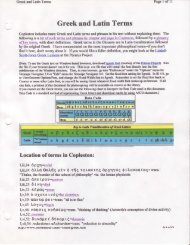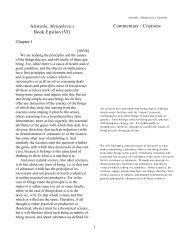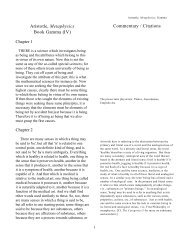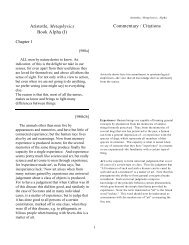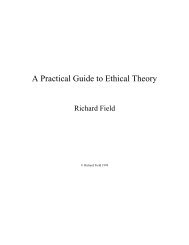Aristotle, Metaphysics Book Zeta (VII) Commentary ... - CATpages
Aristotle, Metaphysics Book Zeta (VII) Commentary ... - CATpages
Aristotle, Metaphysics Book Zeta (VII) Commentary ... - CATpages
Create successful ePaper yourself
Turn your PDF publications into a flip-book with our unique Google optimized e-Paper software.
<strong>Aristotle</strong>, <strong>Metaphysics</strong>, <strong>Zeta</strong><br />
another sense other things will have them.<br />
Clearly, then, definition is the formula of the<br />
essence, and essence belongs to substances either<br />
alone or chiefly and primarily and in the<br />
unqualified sense.<br />
Chapter 6<br />
We must inquire whether each thing and its<br />
essence are the same or different. This is of some<br />
use for the inquiry concerning substance; for<br />
each thing is thought to be not different from its<br />
substance, and the essence is said to be the<br />
substance of each thing.<br />
Now in the case of accidental unities the two<br />
would be generally thought to be different, e.g.<br />
white man would be thought to be different from<br />
the essence of white man. For if they are the<br />
same, the essence of man and that of white man<br />
are also the same; for a man and a white man are<br />
the same thing, as people say, so that the essence<br />
of white man and that of man would be also the<br />
same. But perhaps it does not follow that the<br />
essence of accidental unities should be the same<br />
as that of the simple terms. For the extreme<br />
terms are not in the same way identical with the<br />
middle term. But perhaps this might be thought<br />
to follow, that the extreme terms, the accidents,<br />
should turn out to be the same, e.g. the essence<br />
of white and that of musical; but this is not<br />
actually thought to be the case.<br />
But in the case of so-called self-subsistent<br />
things, is a thing necessarily the same as its<br />
essence? E.g. if there are some substances which<br />
have no other substances nor entities prior to<br />
them--substances such as some assert the Ideas to<br />
be? If the essence of good is to be different from<br />
good-itself, and the essence of animal from<br />
animal-itself, and the essence of being from<br />
being-itself, there will, firstly, be other<br />
substances and entities and Ideas besides those<br />
which are asserted, and, secondly, these others<br />
will be prior substances, if essence is substance.<br />
And if the posterior substances and the prior are<br />
severed from each other, (a) there will be no<br />
knowledge of the former, and (b) the latter will<br />
The question here, simply, is whether the essence of<br />
something, the "what it is to be that thing," is the same<br />
numerically as the thing itself, or should we recognize a<br />
distinction between the two. There is good reason to<br />
distinguish the two with respect to accidents, such as white,<br />
since if "what it is to be a white human" is identical with<br />
the white human, and the white human is identical with<br />
"what it is to be a human," then the essence of white human<br />
and human would be identical by transitivity (if a = b, and<br />
b = c, then a = c). But this is clearly wrong: being a man<br />
does not imply being white. Thus, a human is not identical<br />
with his color, and more generally a substance is not<br />
identical with his accidents.<br />
With respect to primary beings or substances, without<br />
reference to accidents, however, the opposite view must be<br />
accepted , namely, that a thing is identical with its essence.<br />
Aristot le discu sses this initially with resp ect t o Plato 's<br />
hypothesis of the existence of forms. It is unclear why he<br />
does this, since later he will reject this theory, but he<br />
clearly believes that the absurdities of severing a form from<br />
its essence will apply as well to sensible things. So let us<br />
suppose the existence of Platonic forms, such as the form<br />
of the good . Now, if the good is not identical with its<br />
essence, then we must suppose the existence of another,<br />
logically prior, substance--the essence of the good. This<br />
implies first of all that we could not know the good, since<br />
we know a thing by its essence (e.g., I know what Socrates<br />
is by knowing what a human is). Secondly, this implies<br />
that the essences of forms (the prior substances) would not<br />
9



